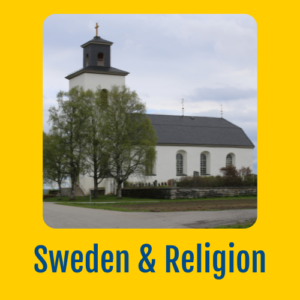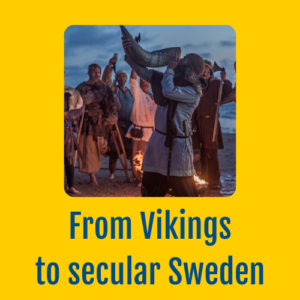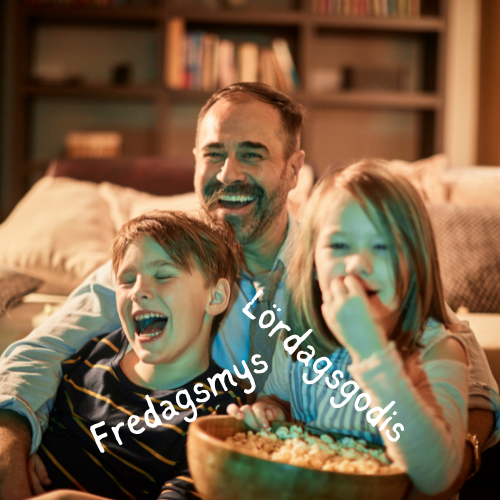Why do you ask this?
One of the pillars of the US is freedom of religion and has been from the very birth of the country.
But still, religion plays a very important role in many people’s lives.
And not just when it comes to faith, a question that surprised me when I first moved here was
“What church do you go to?”
In Sweden, it is very unusual to talk about religion and personal beliefs unless it is with people you are really close to. But that doesn’t mean that Swedes are non-religious, it just is something that we keep to ourselves. So today, let’s do what Swedes so seldom do, let’s talk about religion.

From Vikings to a secular Sweden?
Let’s start with a quick stroll through Sweden’s religious history as a backdrop. Many of you might have heard about our pre-Christian Norse religion during the era of the Vikings. This was not an organized religion, but more of a cultural system using rites, among the rituals even sacrifice of animals and sometimes even humans. It was a system of plural gods which all had different responsibilities, and the most known is Odin who was responsible for all wars and warriors, and Thor who was responsible for everything going on in the sky.
These beliefs persisted until the 12th century. Sweden was Christianized in 1164by the Catholic church and was the last of the Scandinavian country to become Catholics. At the end of the 1500s, Sweden conformed from Catholicism to Protestantism and the Lutheran church became state-sanctioned. Even today the Lutheran Evangelist church, called the Church of Sweden or Svenska kyrkan, is the largest church with around 55% of all Swedes being members.
But that does not in any way reflect if Swedes are religious or not, and to explain that we need to take a closer look at the changes within the Church of Sweden as well as Swedish laws.
The church of Sweden was until the year 2000 the official state church when it was separated from the state and Sweden became the only nordic country without a state church. But changes had started before that. Up till 1996 you automatically became a member of the Church of Sweden at birth.
Nowadays people have to actively choose to join.
Everybody born before 1996 have to make a conscious decision to leave the church and many did so but not all. This explains the still rather high number of 55% belonging to the Church of Sweden. According to an EU study from 2010, only 18% of Swedes believe there is a God, and only 3.8% attend religious service weekly.
But this doesn’t mean that people don’t attend church now and then, Close to half of all Swedes baptize their children in church, and 3 out of 4 funerals take place in the church. Several of the Christian holidays are still on the Swedish calendar, like Easter, All Saints Day, and Christmas.
And even in the public Swedish schools, which are required to be non-confessional, it is common to see celebrations during Easter and Christmas. And almost every school celebrates Santa Lucia on December 13th, but more about her in a later episode.

So what does this mean for faith?
Even though the Church of Sweden is in decline other churches and religions are increasing. It is difficult to estimate any number of religious affiliations since Swedish law forbids any registration of people on the basis of their religion.
But we know that next to the Church of Sweden we have free churches, which also are within the protestant group but are independent of the church of Sweden, which is characteristic of Evangelical, Pentecostal, Methodist, and Baptist elements.
Sweden’s Jewish community is estimated to be about 15,000 to 20,000 people and they are one of Sweden’s 5 official minorities, with Yiddish being one of the officially recognized minority languages.
The Catholic church also reports increasing membership, and the primary source for this is said to be immigration. There are also many country-specific churches, such as Eastern-orthodox, and Oriental-orthodox. Another growing religion is Islam, also in large due to immigration.
So do Swedes not talk about religion?
There are two ways of looking at this;
- Talking about your personal beliefs
- A more general discussion about religion and its impact on society
When it comes to the first aspect, talking about your personal beliefs, this is not something you usually do unless you are in an environment that obviously encourages such conversations such as a church or other religious gatherings.
As a matter of fact, I still have friends back in Sweden that I have no idea about if they are religious or not, and if so what their beliefs are. It has never been important in my daily interaction with them to know.
And even if I was invited to a christening in the church of Sweden, that wouldn’t tell me if they are Christians or just follow traditions.
When we look at talking about religion from a non-personal perspective there is a difference.
Take a look at the public schools for example, even though they are non-confessional, they don’t stay away from the topic of religion. Religious knowledge is a part of the curriculum and has quite a detailed syllabus for grades 1-9.
I will have a link to the English version of the curriculum in the show-notes and the description for those who are interested, and the part of religion starts on page 220.
The first sentence within the part about the aim for Religion is, and I quote
Teaching in religion should aim at helping the pupils to develop knowledge of religions and other outlooks on life in their own society and in other parts of the world.
https://www.skolverket.se/download/18.31c292d516e7445866a218f/1576654682907/pdf3984.pdf
End Quote
And the religions that are named are;
Christianity
Islam
Judaism
Hinduism
Buddhism
And then we have other outlooks, which can include for example atheism.
I remember teaching in grades 4, 5, and 6 how interesting it was to compare different religions’ views of life and death, for example, kids at that age have such an open mind and are willing to compare different ways of thinking, believing, and describing the world.
Religion can also often be discussed in a more public setting, like politics for example, which ultimately led to the separation between state and church in Sweden.
Before I leave you for today, I guess many of you are thinking. What does she believe, and what church does she belong to? And I will answer that the same way I used to answer my students when they asked the same question
If I tell you, would it change how you think about me?
If the answer is no, then it doesn’t matter and I can keep it to myself
If the answer is yes, I don’t want your opinion of me to be based on my personal beliefs rather than my actions so I chose to keep it to myself.
I hope you enjoyed today’s show, and that you will help me by sharing it with someone you think would appreciate it as well. I would be grateful.
Until next time, as we say in Sweden
Hej Då




